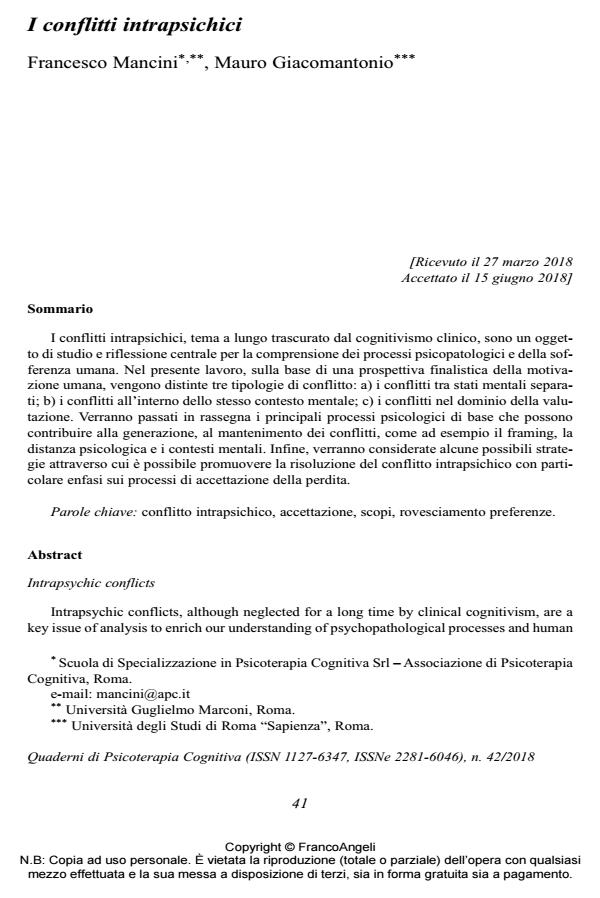Intrapsychic conflicts
Journal title QUADERNI DI PSICOTERAPIA COGNITIVA
Author/s Francesco Mancini, Mauro Giacomantonio
Publishing Year 2018 Issue 2018/42
Language Italian Pages 24 P. 41-64 File size 139 KB
DOI 10.3280/QPC2018-042004
DOI is like a bar code for intellectual property: to have more infomation
click here
Below, you can see the article first page
If you want to buy this article in PDF format, you can do it, following the instructions to buy download credits

FrancoAngeli is member of Publishers International Linking Association, Inc (PILA), a not-for-profit association which run the CrossRef service enabling links to and from online scholarly content.
Intrapsychic conflicts, although neglected for a long time by clinical cognitivism, are a key issue of analysis to enrich our understanding of psychopathological processes and human suffering. In the present work, based on a finalistic view of human motivation, we distinguish three types of conflict: a) conflicts between separate mental states; b) conflicts within the same mental context; c) conflicts pertaining evaluations. We will review the basic psychological processes involved in the generation and perseverance of conflicts such as framing, psychological distance and mental contexts. Potential strategies to promote the resolution of intrapsychic conflicts will be examined with particular emphasis on acceptance of the loss.
Keywords: Intrapsychic conflict, acceptance, goals, preference reversal parole.
- CBT Case Formulation as Therapeutic Process Angelo Maria Saliani, Claudia Perdighe, Barbara Barcaccia, Francesco Mancini, pp.45 (ISBN:978-3-030-63586-2)
- Il contributo delle ricerche del III Centro di Psicoterapia Cognitiva alla comprensione delle patologie della personalità Antonio Semerari, in QUADERNI DI PSICOTERAPIA COGNITIVA 42/2018 pp.65
DOI: 10.3280/QPC2018-042005 - Un modello cognitivo delle dipendenze affettive patologiche Erica Pugliese, Angelo Maria Saliani, Francesco Mancini, in PSICOBIETTIVO 1/2019 pp.43
DOI: 10.3280/PSOB2019-001005
Francesco Mancini, Mauro Giacomantonio, I conflitti intrapsichici in "QUADERNI DI PSICOTERAPIA COGNITIVA" 42/2018, pp 41-64, DOI: 10.3280/QPC2018-042004